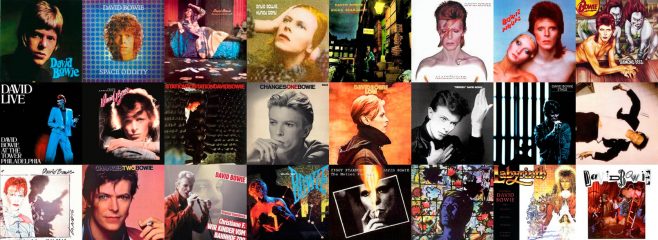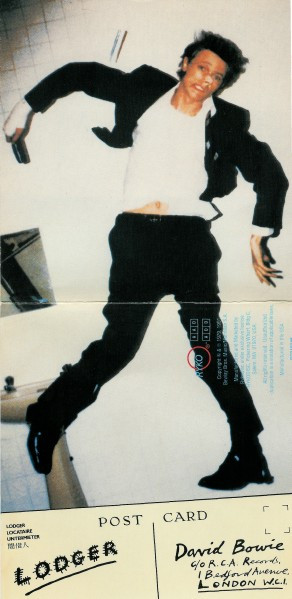
“Lodger” is David Bowie’s 13th studio album, originally released on 18th May 1979.
For me, the “Lodger” album will always have a special place in my heart, for this is where my personal David Bowie journey began all those many years ago.
On 23 April 1979, I was sitting in front of the TV watching one of my favourite shows at the time, “The Kenny Everett Video Show”, when this guy came on and sang a song I instantly loved called “Boys Keep Swinging“. It was then followed by a hilarious little skit with Everett in which his character Angry of Mayfair said “I fought for people like you, and I never got one” !! Watch the performance here.
I then chased up who this David Bowie person was and so my exhilarating, joyous David Bowie journey began…
By 1979, David Bowie was in a good place, artistically, commercially and personally. He had recently released two killer albums in both “Low” and “Heroes” that were artistic triumphs and for which Bowie was rightly very proud. He had also spent much of 1978 completing a hugely successful and critically acclaimed “Isolar II” world tour promoting both albums. He was also getting on top of several personal issues, from his multiple managerial problems, getting his divorce from Angie Bowie mostly sorted and finally dealing in the main with his drug and alcohol abuse issues.
So it was with some confidence and sense of positiveness that Bowie decided to record a new album in September 1978. Recorded mainly at Mountain Studios, Montreux Switzerland near his new home residence (and later finished at Record Plant Studios, New York), he gathered together most of his live band to complete what is commonly referred to as the “Berlin Trilogy”. Berlin ? But this was recorded in Montreux. Yes I know, don’t ask…
Two key collaborators from the previous two albums returned, Tony Visconti as producer and Brian Eno as artistic sounding board and fellow experimental pioneer. The musicians were primarily those from the world tour, Carlos Alomar on rhythm guitar, Dennis Davis on drums, George Murray on bass guitar, the rather excellent Adrian Belew on lead guitar (from King Crimson and recently nicked from Frank Zappa’s band), Sean Mayes on piano (from Ziggy Stardust era support band Fumble), Simon House on violin (from Hawkwind) and Roger Powell on synthesizers (from Utopia) although only on the tracks “Repetition” and “Red Money” as Eno played most of the electronic keyboard parts.
Although in many ways just as experimental as the previous two albums, not having a predominantly instrumental second side gave the album a less cutting edge vibe than its predecessors. It made it in some ways a less “challenging” listening experience, but in no way a less rewarding one.
The album can vaguely be described as a concept project with the overall theme on side 1 being of travel (especially within the third world), with side 2 focusing on various wrongs and ills with western society. It’s not a perfect description, but one that fits in the main.
However, the main theme is really still one of playful experimentation and musical adventurism. Eno in particularly was keen to explore and stretch boundaries with his Oblique Strategy cards pushing the musicians past their comfort zone (in some cases, way way past to the point almost of outright revolt). However, Bowie was also keen to make an album with some commercial appeal and in the main, the collaboration worked to make music that satisfied both requirements. Eno would later push the “World Music” theme of side 1 further in his future output and collaborations with David Byrne of Talking Heads.
The album opens with the majestic but somewhat sombre “Fantastic Voyage“. While a travel theme, here the journey is life itself and wouldn’t it be a shame if it were shorten prematurely by nuclear war due to some depressed world leader. Heavy stuff perhaps but the music has an uplifting feel with Dennis Davies gentle drums and various mandolins featuring predominantly in the mix. Bowie’s vocals carry on from where they left off on the “Heroes” album, soaring and magnificent, leaving us with hope that things will end up OK. The B-side to the “Boys Keep Swinging” single, I remember being absolutely thrilled when Bowie performed this live on the Sydney dates of the “Reality” world tour in 2004.
“African Night Flight” is an absolute blast. Inspired in part after meeting up in a bar with ex-Luftwaffe German pilots when on holidays in Kenya, Bowie sings this track in super fast tempo. The music is chaotic with a thumping piano/bass and a wonderful “cricket menace” effect by Eno, it really is unlike anything Bowie has ever recorded. The backing vocals “asanti habari habari” add a nice touch. I’m pretty sure this has never been performed live, it’s no wonder really.
Next comes the wonderful “Move On“, a song which celebrates travel and Bowie’s struggle to ever stay in one place for very long. With an almost postcard view of various places Bowie has visited, it generates a truly romantic sense of the joys of travelling. The music is lush yet unsettled, in part no doubt as it’s basically “All The Young Dudes” played backwards. Again, the backing vocals (sung mainly by Tony Visconti) and superb throughout the whole album, are another highlight with this track (sounding indeed like something sung backwards). Again, another song that I don’t think has ever been played live and in this case, all the pity. The track snuck into many people’s record collections when it (rather oddly) became the B-side to Bowie’s monster No. 1 UK hit “Ashes To Ashes“.
“Yassassin” is a bit of an oddity for Bowie. With its Jamaican reggae vibe mixed in with Turkish sounding violins by Simon House, it’s a bizarre mixture of sounds and an unusual use of a musical form which Bowie had never really played around with before (he would take on the reggae sound again on the “Tonight” album in 1984.). It all sounds rather fabulous as Bowie sings about the dignity of being a working class man as he travels from destination to destination, again pleading with authority to just leave him alone. Yassassin is basically Turkish for “long life”, a phase Bowie came across whilst living in the heavily Turkish populated quarter of Berlin, Neuköln. A bit of a gem.
As is “Red Sails“, an absolutely hilarious, joyous tale of travelling the seas, with one of the absolute best Bowie vocals ever. The final “We’re gonna sail to the hinterland, And it’s far far, far far far, far far far away, Its a far far, far far far fa da da da-da da” is worth price of admission alone. The music here is also a highlight, with a thumping rhythm and all sorts of wonderful musical soundscapes swishing between speakers. The gang really are magnificent here and ends side on a literal high.
Side two starts with the rather catchy “DJ“, with Bowie detailing the perils of being a DJ and the horror that would ensue if ever there was a moment of silence. This is where Adrian Belew starts to really shine with some great guitar sounds throughout. The second single off the album, it was a surprising flop and (I think) assisted in damaging the overall reputation of the album. It did feature a brilliant video with Bowie playing around as a non-too serious DJ and scenes of him walking down a street in public, being accosted by an unbelieving crowd. Watch it here.
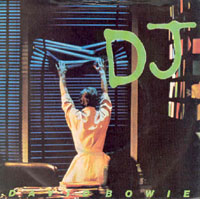
“Look Back in Anger” would perhaps have made a much better single. It features an absolutely amazing drumming performance by Dennis Davis and is one those Bowie classics that lurks in his catalog. Telling the tale of a disgruntled angel, the music is just teeming with energy and with bursts of Carlos Alomar guitar scrapes and fabulous backing vocals, really is 3 minutes of glorious fun. It was going to be the 3rd single off the album, but after the failure of “DJ”, was released only in the US where it flopped. Another great video, it featured Bowie in a scene from Oscar Wilde’s “The Picture of Dorian Gray” as we watch Bowie slowly disintegrate along with the painting he’s working on. Watch it here.
“Boys Keep Swinging” is one of my all time favourite tracks, not only because it was the first time I “met” Bowie, but because it really is one of his all time great songs. Full of energy and bouncy fun, it’s terribly sexist but very much with tongue firmly in cheek. Musically it has the same chord changes as the previous “Fantastic Voyage” (there were plans to record the entire album with the same chords), but with a different tempo and melody. To make things interesting and add a certain “garage band” charm to the piece, they put Carlos Alomar on drums and Dennis Davis (assisted by Tony Visconti) on bass. With Eno adding his magic and a superb metal on metal screech by Adrian Belew, it’s the album’s highlight. Released as the leading single, it reached No. 7 in the charts before the video featured on “Top of the Pops”. With a cavalier Bowie aka Bowie in his Kenny Everett performance, 3 somewhat odd looking female backing singers appear during the chorus. During the closing musical sequence, the first back singer walks down a catwalk before pulling off wig and swiping lipstick dramatically across the face. It was Bowie in drag. As was the second backup singer who did the same thing. The 3rd one (OK, we know it’s Bowie now, looking a little like an unwell Marlene Dietrich this time) blows us a kiss as the film fades. Hilarious stuff, but perhaps a little too confronting for a UK about to vote in Margaret Thatcher. The single started to then head in the opposite direction. Watch this classic video here.
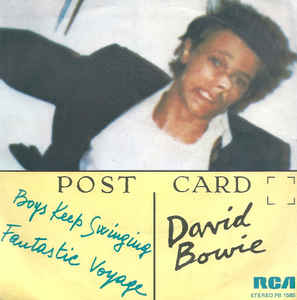
“Repetition” for me anyways gets voted the weakest track on the album. Telling the sobering tale of domestic violence, Johnny is a big man with family, who’s life if one full of regrets and who takes it out on his poor suffering wife. Sang by Bowie in an emotionless monotone, it makes for uncomfortable listening.
“Red Money” is basically “Sister Midnight“, (the Iggy Pop track off the simply brilliant 1977 “The Idiot” album) with different lyrics. Musically, it’s almost identical to the Iggy Pop version, but with a cleaner, punchier sound. The “red box” from the lyrics is said by Bowie to refer to responsibility and how many don’t deal well with it. Which then takes up back to the first track and how important responsibility is for those in charge…
The album cover and packaging is one of Bowie’s most interesting/striking. Featuring a very unwell, battered and squished Bowie, I “think” it’s all a take on the 1976 Roman Polanski movie “The Tenant” (Lodger, get it) that featured a character who attempted suicide by throwing herself off a balcony and falling through a pane of glass. Looking I would assume just as Bowie does on the album cover. The inner sleeve features a number of macabre death scenes, including Che Guevara’s corpse, the body of Christ and Bowie being made up for the cover.
Commercially, the album did well, reaching a respectable No. 4 in the UK and No. 20 in the US. But critically, it received a somewhat cool reception, with many considering it the runt of the Berlin Trilogy. While it certainly lacks some of the originality of the soundscapes found on both “Low” and “Heroes”, it’s always made up for that by containing a collection of simply fantastic songs that sound fresh and exciting and containing something that is lacking in the previous two albums, humour. “Lodger” is musically brilliant, but it also contains a humour that I’ve always loved about the album. Songs such as “African Night Flight”, “Red Sails” and “Boys Keep Swinging” are a blast and give an insight into the humour that Bowie likes to hide away.
“Lodger” is perhaps THE most underrated of all Bowie’s albums, with one possible exception which I’ll get to later in this series.
After spending much of 1978 on the road, Bowie decided to not tour the album and this also perhaps added to history being less kind to the album that it deserved. Instead, he teamed up with David Mallet to produce the 3 wonderful ground breaking videos for “DJ”, “Look back In Anger” and “Boys Keep Swinging”.
As with all Bowie albums, there have been a number of notable re-releases over the years. In 1991, as part of the excellent Rykodisc series, it was released with two bonus tracks, a re-worked “Look Back In Anger” and:
“I Pray, Olé” is actually rather good with a very catchy quality, especially the “Can you make, can you make it through?” chorus. It would have fitted very well on Side 2 somewhere and was a bit of a gem when it came out. To my knowledge, I don’t think this has ever been re-released since, not even on the “A New Career In A New Town” box set so it’s a bit of a rarity in a physical format.
Speaking of which, in 2017, the box set “A New Career In A New Town” was released that featured Bowie’s output between 1977-1982. The BIG highlight of the package was a totally new re-mix of the album by original producer Tony Visconti. Although Bowie was said to consider the album one of his favourites, both he and Visconti were said to be unhappy with the final mix of the album, considering it a bit rushed and “muddy” in sound. This re-mix was positioned as how the album should have been mixed in the first place.
The results are mixed. In terms of the music and how it sounds sonically, it’s definitely an improvement, with the overall sound much more dynamic, vibrant and “cleaner”. BUT, it’s been ruined by the over-treatment on Bowie’s vocal. One of THE strengths of the album is Bowie’s vocal performance, which is among the best on any album. However, the re-mix has added way too much effects on the vocals track, with too much echo and the like which distracts from the album. When it comes to Bowie, the cleaner the vocal the better and I wish they left that part alone. Overall it’s certainly worth a listen but ultimately I prefer the original mix overall.
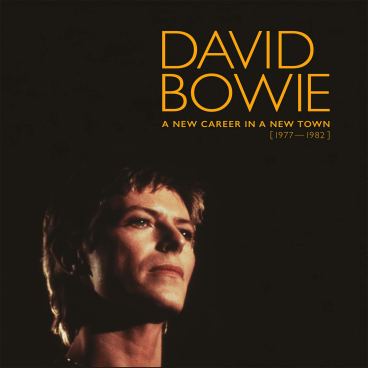
This would be the last time Bowie would work with Brian Eno for nearly 20 years. Eno felt the “spark” had gone out of the musical collaboration during the making of “Lodger” and while amiable, they went their separate very successful ways. But in 1995, they decided to get together again and record an absolutely superb album, one which left many critics scratching their heads at the time but one which history I think has determined really is an artistic masterpiece that perhaps is THE most underrated Bowie album of them all.
But that’s a story for another day…
Best Tracks: “Boy’s Keep Swinging“, “African Night Flight“, “Look Back In Anger“.
